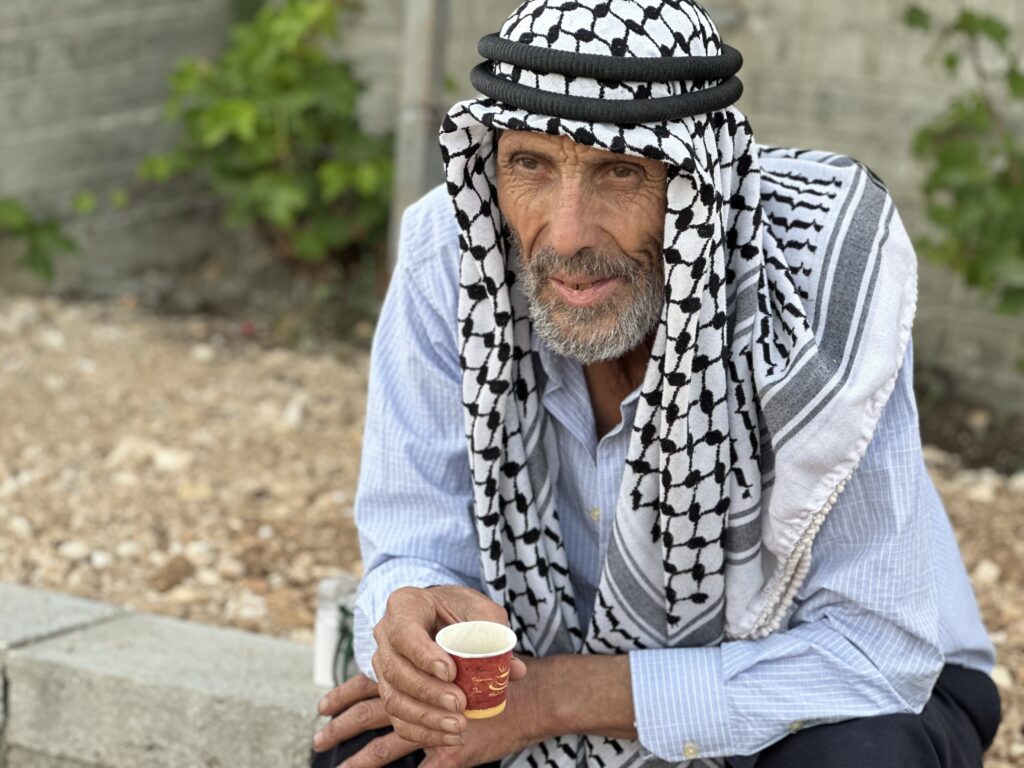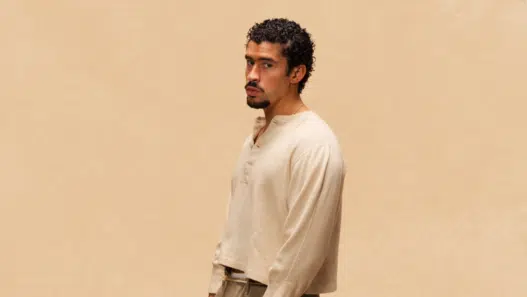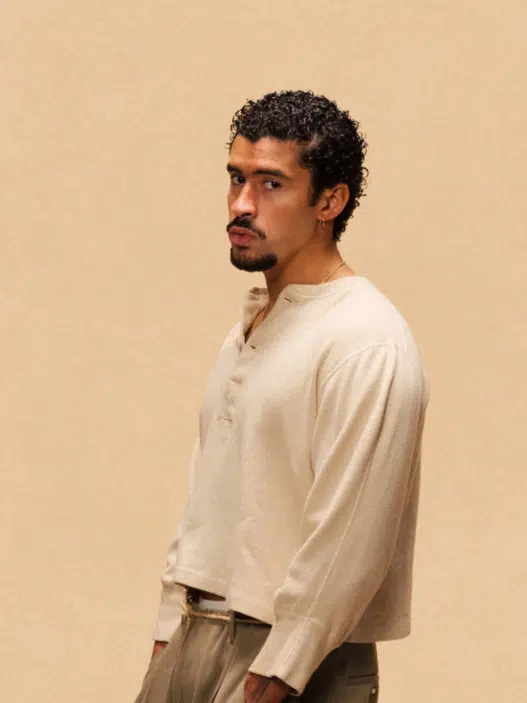Khadra Abu Sariya’s voice trembles and her eyes well up as she recalls a song etched into memory by pain. In a modest home in Jenin’s Zahra neighborhood, where she’s taken refuge from recent Israeli escalations, the 87-year-old softly hums a lullaby her mother once whispered to her — the night their village, Zir’in, fell during the 1948 Nakba which marked the mass displacement of Palestinians that accompanied the creation of Israel.
“Our house had a high roof… oh God, may we see it again,” Abu Sariya murmurs. The tune — part lullaby, part lament — slips through her whisper, fragile in its delivery and faded by the decades. Abu Sariya was ten years old when Israeli militias approached Ziir’in. News of ethnic cleansing and massacres, like the one in Deir Yassin where over 350 were killed, had already spread to her village, so they, like thousands of others, fled in fear with little more than the clothes on their backs. The journey, to what would later become Jenin refugee camp, and her home for the following decades, was not a lengthy one, but became permanently etched into her memory – along with the songs that her family and friends sang during the displacement.

“I remember grown men crying, and my mother’s trembling hands as she packed our bread,” Abu Sariya says, her voice distant, her fingertips gently tracing the embroidery of her thobe — a design unique to Zir’in. “But most of all, I remember the songs. That’s how the women coped. They didn’t say goodbye with words — they sang.” She pauses, then recalls one of her mother’s parting verses: “Oh graceful one, climbing the ladder, may God keep you safe from the eyes of the people. Oh, you who walk the road to the homeland, be safe. Be safe, and may peace be upon our land.”
For 77 years, Palestinian folk music has carried the memory of the Nakba from one generation to the next, preserving it with a vividness no textbook could match. These songs—mostly improvised, then repeated over the years and rooted in oral tradition—have become a people’s archive in exile, woven from grief, hope, and defiance. They document what official records often overlook: the sound of keys turning in doors never reopened, of wheat fields overtaken by wild grass, of lives uprooted and replanted in refugee camps.
According to Palestinian folklore scholar Nabil Alqam, “the folk song is the most immediate literary form in our culture — it responds in real time to trauma, war, migration, and hope. It carries what gets erased from textbooks or censored from public discourse.”
These Nakba songs and laments have permeated every aspect of Palestinian life for the last seven decades, sung in everything from celebrations to funerals, but they’ve more recently taken on renewed meaning for thousands like Abu Sariya, now enduring yet another displacement. Aside from Israel’s continued war on Gaza, the Israeli military has waged its most intense military operation in decades on the occupied West Bank, pushing more than 40,000 Palestinians from Jenin and Tulkarem refugee camps into displacement this year. Abu Sariya, who had lived in Jenin’s refugee camp since May of 1948, was made to leave, living with one of her nieces in the city of Jenin. “They drove us out of our homes back then, and here we are evicted once again. And these songs are just as relevant,” she says.
Songs as testimony
In his olive grove near Jenin, 67-year-old Zayed Shahadeh listens to old recordings as he works the land. Though born after the Nakba, his father’s stories—of fleeing from Acre, of imprisonment in Israeli prisons, of a youth stolen—shaped his own sense of exile. “These songs were our newspaper, our history books, our therapy,” he says. “They told of the wheat harvest, the massacres, the camps. Everything.”
Shahadeh favors singing in the ‘ataaba’ style which is a four-line stanza that relies on wordplay and improvised rhyme. Even with its heart-wrenching lyrics and melancholic melodies, these free-flowing poetry are a staple in weddings, festivals and celebrations. “We sing of the fig tree we lost, the checkpoint that stands in its place, and the right of return,” he says.
Alqam says several Palestinian singers have become folk icons, their songs tracing the arc of displacement and resistance. In refugee camps across Lebanon, Syria, and Jordan, poets and musicians like Ibrahim Muhammad Saleh — better known as Abu Arab — turned verse into nationalist anthem. A refugee forced into displacement by the Nakba from al-Shajara near Tiberias, Abu Arab’s most enduring songs, such as Ya Tota al-Dar (“Oh Mulberry Tree of Our Home”) and Ya Yumma Fi Daqa (“O Mama, There’s a Knock on Our Door”), are still sung today. His lyrics wove together grief and defiance: “Oh, Mulberry of our Home, be patient, no matter how difficult time gets. We will return. We must return, no matter how long the road is.”
Alqam notes that “Abu Arab’s influence reached deep into the cultural identity of a scattered nation”. With his ensemble, the Palestinian Folklore Group, he performed across the Arab world, his music becoming both a balm and a battle cry. Alongside him rose other collectives like Firqat al-‘Ashiqin, founded in Damascus in 1977, which performed adaptations of poetry by Mahmoud Darwish, Samih al-Qasim, and Tawfiq Zayyad — using song to echo the political pulse of the time. Their tracks, rich with defiance and revolutionary zeal, helped transform folk into political theatre. “The 1950s and 60s were the years of mourning,” explains Alqam. “But by the 70s, songs were being used to mobilize, to unify. It was a record of the times — more accessible than books, more emotional than slogans.”
Alqam, who has published extensively on Palestinian oral heritage, points out that the popular songs of this era used simple metaphors to talk about complex realities. “Instead of saying ‘our leaders failed us,’ they sang about seven lions defeated by a rabbit — an indictment of the Arab armies in 1948. Instead of recounting diplomatic betrayals, they sang of brides fleeing weddings because enemy soldiers came into their place.” This lyrical tradition, he notes, also adapted to every subsequent chapter of Palestinian history: from the 1967 Naksa, to the First Intifada, to the sieges of Gaza.
‘Every emotion is political’
This continuum — from Nakba ballads to nationalist anthems — has persisted, evolving in form but not essence. Musa Hafez, one of today’s most revered Palestinian folk singers, sees himself as part of that lineage. “We are not just entertainers,” he says. “We are archivists. We carry the memories of our villages, of life before exile.”
Hafez, 67, was born in the village of Umm al-Rihan in Jenin. Though he never lived in pre-1948 Palestine, his performances evoke it with visceral immediacy. At weddings, he sings for crowds of young Palestinians — many of whom can recite his lyrics by heart. “The youth know these songs better than any political speech,” he says. “It’s how we survive culturally. If we’re defeated politically, we must not be defeated culturally.”
He estimates that he has performed at more than 3,000 weddings and national celebrations across the West Bank and Gaza. He began singing at 17, and over time has gathered and preserved more than 70% of Abu Arab’s folk discography. His breakout song, Tifl al-Hijara (Child of the Stones), became so iconic that Lebanese legend Wadih El Safi reportedly covered it after slightly altering the lyrics.
This intergenerational continuity is striking. Hafez notes how younger musicians, including those in the diaspora, are not abandoning tradition — they’re adapting it. He names Billel Shbeeb, a Jordanian-Palestinian rapper in his twenties, who merges trap beats with historic refrains. His breakout track, Benhebbha Tool w ‘Ard (We Love Her Length and Breadth), is a paean to Gaza that samples a traditional wedding chant. “Even love songs today mention Palestine,” Hafez says, “because every emotion for us is political.”
In Palestinian communities — from the rubble of Jenin to refugee camps in Lebanon to wedding halls in Amman — the folk song remains alive. It is sung in joy and grief, adapted and updated, but always rooted in place. In every verse is a village remembered, a promise remade.
For Abu Sariya, who is torn by her two displacements — the song remains her most faithful companion. “We have no home, but we have the song,” she says. “And as long as we sing it, we are still there.”
This piece was published in collaboration with Egab.





















